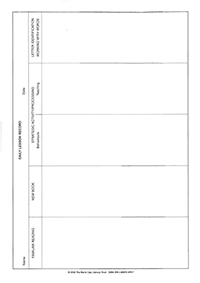
Literacy Lessons Designed for Individuals
2nd Edition
Literacy Lessons Designed for Individuals is an essential text for all teachers who provide individual instruction for young children having difficulty learning to read and write.
This new edition of Marie Clay's important book elaborates the teaching procedures, implementation practices and theoretical understandings that underpin the highly effective early literacy intervention Reading Recovery. Readers of the text have ready access to guidance for teaching children individually and for intervening effectively to undercut literacy difficulties in schools.
Literacy Lessons Designed for Individuals describes an early literacy intervention that:
- is individually designed and delivered by experienced teachers (who have received a further year of preparation for the role)
- builds on the child's strengths as the only possible foundation for further learning
- is directed towards developing in-the-head processes for working with written language
- utilises reading and writing activities as mutually facilitating of early literacy learning
- aims to maximise the child's contribution to his or her own learning in every teaching interaction.
The teaching procedures described in this book have been progressively refined and revised over many years in response to the reported experience of Reading Recovery professionals, new research and changes in education systems worldwide. Careful attention to organisation of content, section headings and text layout in the new edition has produced a text that is both informative and teacher-friendly.
Reading Recovery arose from a theory of how children learn to manage the complex tasks of reading and writing continuous text. Marie Clay's account of the research and theoretical foundations of this early intervention is set out in three recently re-published books: Becoming Literate: The Construction of Inner Control, Change Over Time in Children's Literacy Development and By Different Paths to Common Outcomes.
The assessment tasks that assist classroom teachers to monitor young children's progress with early literacy learning, and to identify early those needing additional help, are published in a fourth book, An Observation Survey of Early Literacy Achievement, now in its fourth edition.
The digital edition of this publication is intended for reference purposes only, we request that you have already purchased a print copy before ordering.
Only the print version of this text should be used with children.
|
AUD incl GST
|
Add to cart | |
| or more | each |
